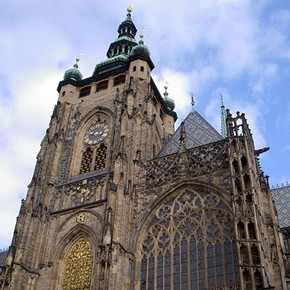This architecture style flourished during the high and medieval period in France that was succeeded by Renaissance architecture. Around 12th century, people in that era developed the previous style, Romanesque, to be the new style. Gothic style then reached its popularity and lasted until the 16th century.
Initially, Gothic style was known as the French Style, or Opus Francigenum. The term Gothic then appeared during the latter part of the Renaissance era as a stylistic offense. Mostly, this wonderful architecture style is applied to build cathedrals, parish churches, or abbeys. However, you can also find the traces in many castles, palaces, town halls, or universities. The characteristics of this architecture style are including the pointed arch, the flying buttress, and the ribbed vault.
Pointed arch is my favorite characteristic of Gothic architecture. Actually, this kind of arch was also used in Romanesque style but they did not pay attention to the shape. Furthermore, when the new style was developed, people noticed that this particular arch would give amazing stability as well as strength for the building. My favorite buildings with pointed arch are Chartres Cathedral in France and Milan Cathedral in Italy.
Another characteristic is the ribbed vault. This is a result of the intersection of two or thee barrel vaults. The previous style used in Romanesque was the groin vault. Compared with groin vault, the use of ribbed vault shows the skill of the masons of the new ideas. Ribbed vault allows us to admire the wonderful construction, although in Renaissance era this technique wad considered as a new for architecture. You can visit Durham Cathedral in England and take a look at the roofs of the choir side aisles. That is my favorite ribbed vault among other building in Gothic.
The next characteristic is the flying buttress, or also known as arc-boutant. This certain type of buttress could be easily found on any religious building such as cathedral. The real function of this buttress is to send out the horizontal force of a vaulted ceiling through the wall to a counterweight outside the building. Therefore, it seems like flying through the air.
However, this type of buttress was not created in Gothic Architecture. Flying buttress was employed by Byzantines in early Romanesque, but it was hidden under the roof or covered by other construction. In Gothic style, it creates a web of stonework in the outside of clerestory walls and gives a great heavenly impression. You can see how wonderful the appearance of this buttress construction in some cathedrals, such as Chartress, Le Mans, Beauvais, and Reims.
With all of the wonderful appearance and impression given by Gothic architecture, this architecture style becomes my favorite product of Renaissance era. You should visit some Gothic style buildings someday, and feel the grandeur of Renaissance era offered by them.











